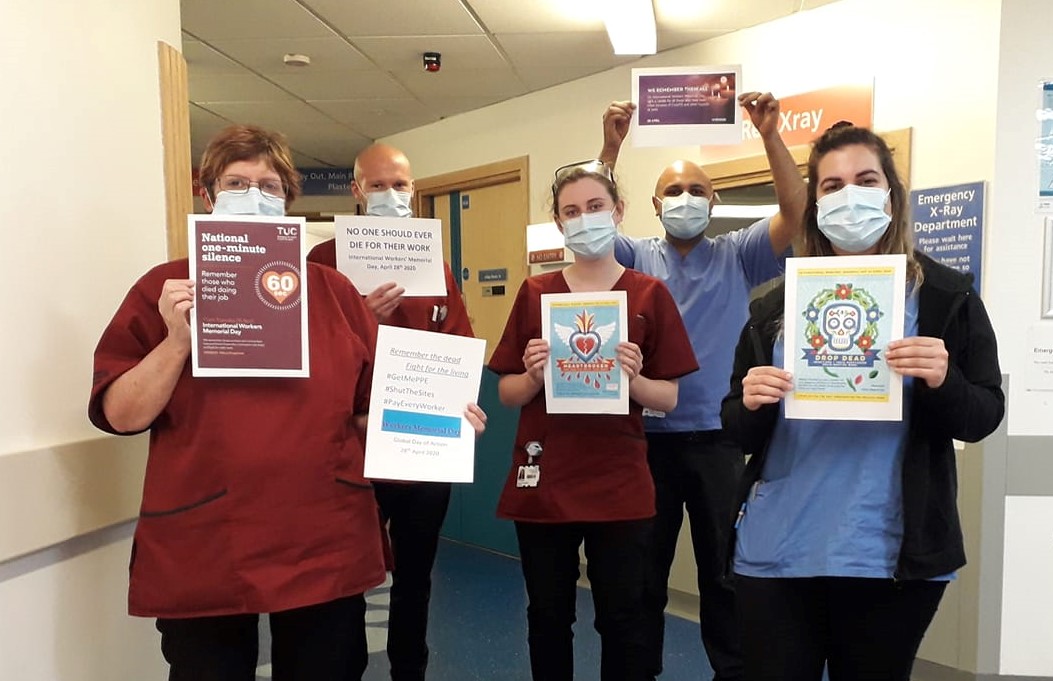Over 200 members and reps from many different trade unions came together on Zoom on Sunday 26 April to discuss the impact of the coronavirus crisis on workers. Organised by the National Shop Stewards Network (NSSN), the meeting highlighted how workers are organising to defend safety and livelihoods during the corona crisis.
Rob Williams, NSSN national chair, opened by stating: “Our attitude is that workers should have no dilution of their pay and conditions, they should have full pay if they are unable to work. Workers cannot pay the price for this pandemic further down the road.” “Workers must have control of workplace safety.”
Lack of PPE
The lack of Personal Protective Equipment (PPE) was consistently raised in the meeting. Over 120 health and social care workers have died since this crisis began, and also many transport workers. Health worker Roger Davey, a member of Unison union, described how the fragmentation of the NHS had resulted in an inability to plan.
Shaun from Reel News reported that to mark International Workers’ Memorial Day on 28 April, health workers at St. Thomas and Guy’s Hospital had agreed to go beyond the one-minute silence called by unions and stay out for 30 minutes in a socially distanced rally, calling for PPE for all key workers, and for all non-essential work to be shut down for the day.
Moe, a London bus driver and member of the Unite union, highlighted that bus driver deaths were completely avoidable. Thanks to a rank-and-file campaign, which Moe was instrumental in organising, workers won measures to seal off the front doors and cut the risk of infection to bus drivers. As a result, travel on London buses is now largely free.
Many reported that workers were organising walkouts using section 44 of the Employment Rights Act 1996. A shop steward in the engineering industry said: “We stood our guys down for two days, and on the third day we had our company come crying to us and say ‘you’re right it is unsafe.’ It emboldened our members having the company come to us.” “We have a lot of engineers furloughed and they’re on 100% pay.”
He explained how workers had drawn up a seven-point safety assessment plan to put to management, starting from when workers’ left home to go to work. If workers are in work, there should be daily reports on safety to the health and management team.
Martin Powell-Davies of the National Education Union (NEU) stated that there must be no return to work in schools unless there is a national agreement. Working-class communities are under pressure, but most parents, including key workers, know it’s not safe. 200,000 have signed the NEU’s petition to open schools only when it is safe.
Onay Kasab, a Unite organiser in London, gave inspiring reports of victories that had been won: 100% pay at Woolwich ferries; Hackney parking attendants winning a four-day week with five days’ pay and concessions on safety; workers at Newham waste services obtaining £24-a-day hazard pay. The union didn’t just quote section 44 and leave it up to members, said Kas, but made the union position clear.
Bea, a University and College Union (UCU) activist in Southampton, described how, as a zero-hour contract worker, she had to fight “tooth and nail” for herself and other precarious university staff to be guaranteed payment of their wages until the end of the academic year.
Capitalists profit
Members of Usdaw, the retail and distribution union, reported that retail bosses were disregarding social-distancing measures to maximise sales which had cost members’ lives. Supermarkets saw an extra £2 billion in sales in March alone. Tesco saved £585 million due to business rates relief. The money is there to pay supermarket workers a wage that reflects their status as key workers, which can be won if fought for by the membership.
This May Day the NSSN will be supporting the campaign to wave red flags and wear red to celebrate International Workers’ Day. Patrick Mulholland from the Nipsa public service union in Northern Ireland explained how the campaign was initiated there after the Irish Trade Union Congress cancelled the normal May Day celebrations. He also spoke about how the Gardaí (Irish police) were used against Debenhams’ workers protesting, observing social distancing, against redundancies in the south of Ireland.
Closing the meeting Rob Williams emphasised the need for collective action, concluding that “the time to fight is now.”









